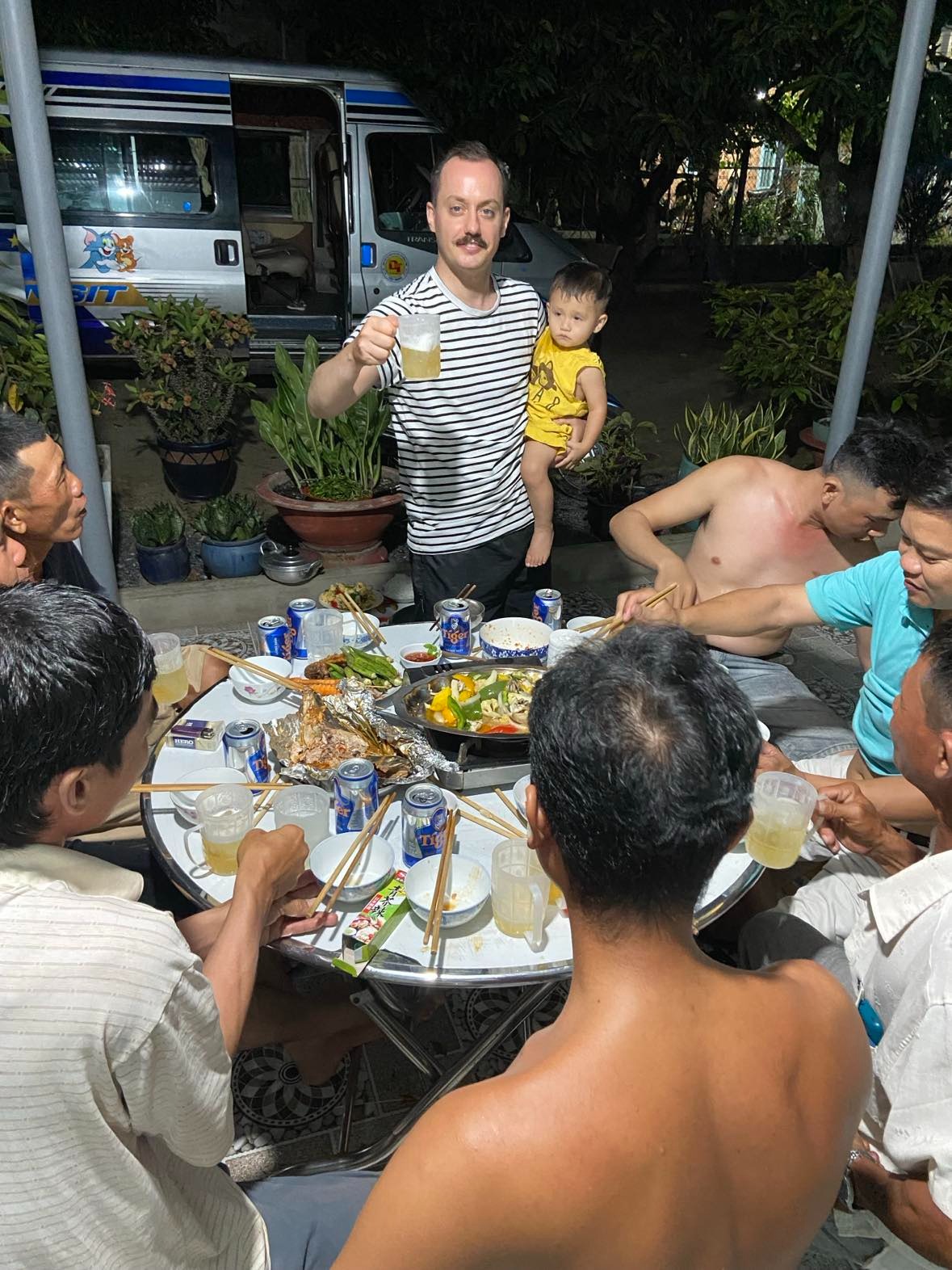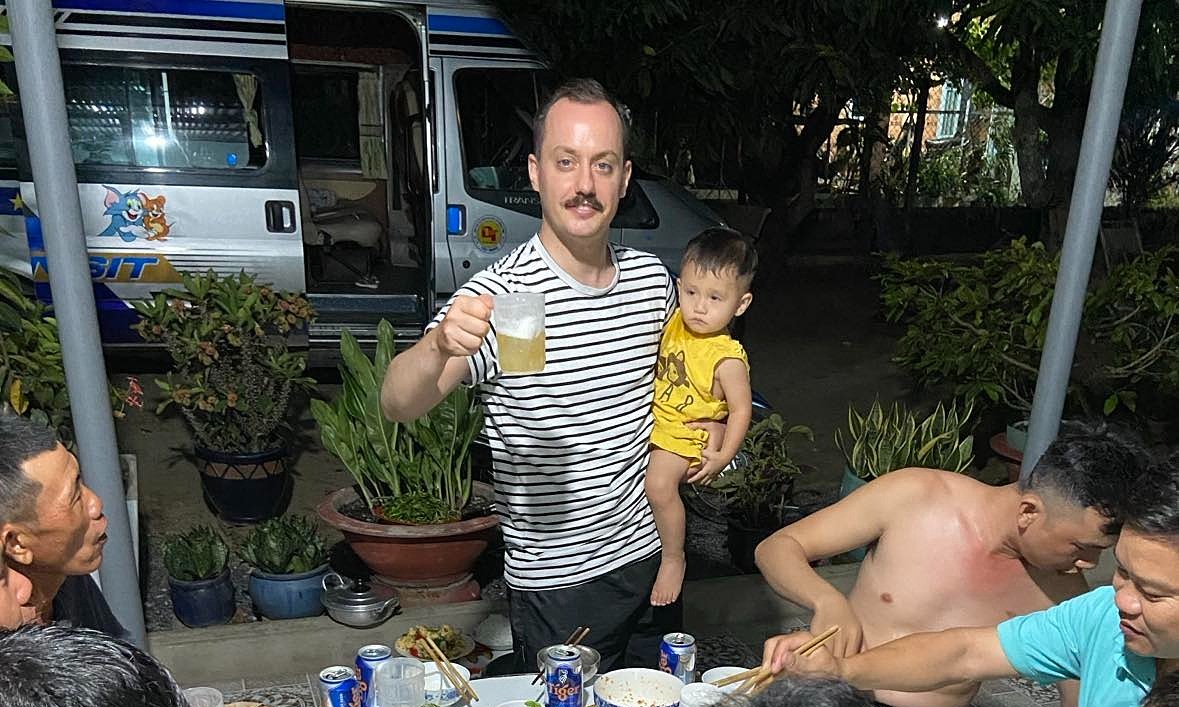While walking on a sidewalk in HCMC’s Tan Phu District, Briton Warren was suddenly pulled aside by a group of strangers and invited to join their roadside drinking session.
The unexpected encounter in 2019, just days after he arrived in Vietnam, left him stunned. But he took a seat. The scene was simple: a small table on the sidewalk with peanuts, grilled dried squid, and five glasses of beer. They raised their drinks as traffic buzzed past.
“I have never had this kind of experience anywhere else,” the 30-year-old says. “Vietnamese people are incredibly open and natural when inviting strangers to drink.” The four Vietnamese men spoke no English but used a translation app to explain local drinking customs, including the popular chant of “Mot, hai, ba, dzo!” (“One, two, three, cheers!”)
He soon realized that drinking in Vietnam follows some unspoken rules: Everyone must raise their glass together, no one drinks alone, if someone makes a toast and drinks, others are expected to follow. “It made me feel pressured and awkward,” he says.
After six years in Vietnam, he now sees drinking not just as a social activity but a way to connect and build relationships. It contrasts with his home country, where drinking is usually reserved for weekends or holidays, typically at pubs, bars or garden parties, and people drink at their own pace.
In Vietnam, alcohol is present everywhere, from restaurants and sidewalks to parks, and consumed more frequently. He says he does not mind. With a high alcohol tolerance and a preference for a lively atmosphere, he finds the culture welcoming. He also appreciates the affordability. “Here, I can drink all night for the price of two or three pints in the U.K.”
For Marcel, a 54-year-old Dutch engineer, the intensity of Vietnamese drinking
came as a shock
. At the first Vietnamese wedding he attended, he saw both the groom and father-in-law get so drunk they had to be carried home. On another occasion, some friends passed out in the toilet from drinking too much.
In his early years living in Vietnam, he found the pressure to drink uncomfortable. Even after declining, people would insist: “Just one drink.” It was especially hard when he wanted to stop or was not in the mood. He also noticed that intoxicated Vietnamese often speak loudly, even at close range. Over time he found ways to manage. “You just pretend to sip and then put the glass down,” he says.
He says locals are often curious about foreigners’ alcohol tolerance and frequently offer drinks. The longer he stayed the more he saw how common it was to raise glasses with strangers, at restaurants, weddings or company gatherings.
At eateries, diners often toast with neighboring tables, competing to shout “dzo” the loudest. He also came to accept the local habit of sharing glasses, which is considered taboo back home. “Thanks to my friends, I came to understand this is just normal here,” he says.

|
|
Timothée Rousselin at a family gathering at his wife’s home in Go Dau District, Tay Ninh Province, southern Vietnam, in April 2025. Photo courtesy of Rousselin |
Warren and Marcel are among many expats who
experience culture shock
due to Vietnam’s drinking customs, a common challenge for foreigners adjusting to local life. British anthropologist David Craig of Durham University has described Vietnam’s “bottoms up” custom as a source of pressure for both locals and foreigners.
Craig’s research, published in the journal PubMed Central, found that 38.6% of men in a southern Mekong Delta province drank more than five glasses per week, reflecting how embedded alcohol consumption is in Vietnamese culture.
Vietnam also leads Southeast Asia in alcohol consumption, according to the World Health Organization’s 2024 report. In 2019, the average person aged 15 and above consumed 8.9 liters of pure alcohol, ahead of Thailand (8.3 liters) and Singapore (2.9 liters).
Travel platform Sens Asia Travel addressed this culture shock in its guide “How to Avoid Culture Shock in Vietnam,” noting that foreigners are often surprised by local traffic, food and drinking habits. Online expat groups in Vietnam get thousands of posts discussing Vietnam’s drinking culture.
Timothée Rousselin, 39, a Frenchman who has lived in HCMC for six years, says Vietnamese people love to celebrate nearly everything, from the end of a workday, weddings and death anniversaries to birthdays, Lunar New Year and football victories. “Drinking is a way for people to open up and bond.”
He finds Vietnam’s spirit of togetherness at the drinking table unique. Friends often urge each other to gulp down half or even the entire glass in one go. He recalls his first drinking session with neighbors in his apartment. One invited another and soon a group had gathered,
chatting through Google Translate
. Everyone was welcomed, and by the end of the night strangers had become close friends, he says.
“What surprised me most was witnessing people reconcile with each other over drinks. In other countries, alcohol usually worsens conflicts. Here, it seems to resolve them.”









